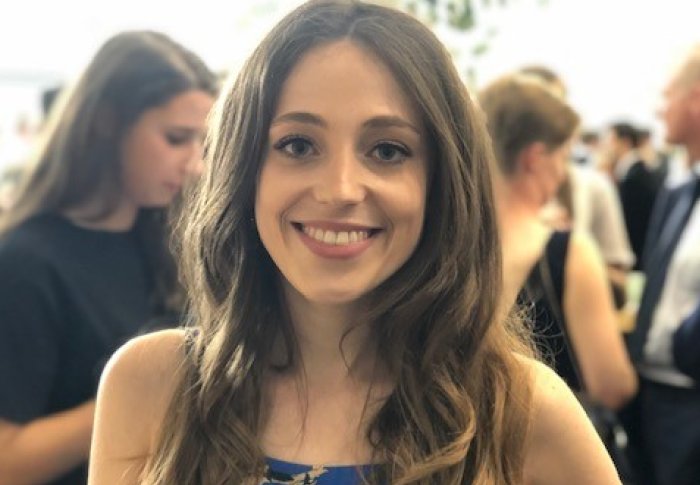Medical students scoop top prizes in 2019 Gold Medal Viva competition

Dr Alice Lee, winner of this year's Gold Medal prize
Recent MBBS graduates, Dr Alice Lee and Dr Nadja Bednarczuk, took home the University of London Gold Medal competition’s top two awards.
“When I received the news that I’d won, I really couldn’t believe it! The Faculty had prepared me brilliantly and given me a much-needed confidence boost before the exam – but I never allowed myself to believe I could win,” Dr Lee, winner of the Gold Medal prize, said.
“I was thrilled that all of my hard work over the years had paid off in such an amazing way, but above all, I felt immense gratitude. I feel so lucky to call myself an Imperial medic, to have received a world-class education by such inspiring mentors, and to have done them proud on the day!”
Each year, every London-based medical school is invited to nominate a small number of newly graduated students to compete, from those who have obtained the highest number of merits and distinctions, and have passed every examination on the first attempt.
During the competition, candidates receive questions from a panel of examiners, testing their knowledge in a variety of areas of medicine. The winner is decided based on the answers the candidates give to these questions.

History of success
First awarded in October 1904, the Gold Medal competition has seen many notable figures take home the award. In 1908, Sir Alexander Fleming won the prize whilst he was a student at St Mary’s Hospital Medical School, one of the constituent medical schools of today’s Imperial College School of Medicine.
The School of Medicine nominates approximately one student for every 75 – around four students per year – to compete for the Gold Medal.
Dr Amir Sam, the School of Medicine’s Head of Curriculum and Assessment Development, said, “One of the most enjoyable times of the academic year for me is when I contact our top final year medical students to let them know that they will be able to represent Imperial College at the Gold Medal competition. Candidates are nominated based on their performance in a wide range of applied knowledge and clinical skills assessments.
“Our nominated students this year excelled in the practice vivas we gave them, and I was confident that they would do really well in the competition!”
Dr Lee’s win brings the School of Medicine’s total wins of the Gold Medal to eight since its formation in 1997, six of those in the last ten years, and follows Dr Jessica Walsh’s 2018 win.
Future plans
Dr Lee moves on to an Academic Foundation Programme in Academic Surgery, based in North West London, enabling her to pursue her passion for research and keeping her close to her university home.
“I set my heart on medicine in secondary school,” said Dr Lee. “I enjoyed science, but I also really liked the idea of interacting with patients.”
She also plans to return to Imperial to teach future medical students.
“My ultimate career goal is to become an Academic Plastic Surgeon. I would love to combine clinical practice with research and education – just like my role models at Imperial. I find teaching incredibly rewarding.”

Winner of this year’s second-place Betuel Prize, Dr Nadja Bednarczuk, said: “I’m very excited! I never expected to win anything, so receiving the news was a really nice surprise!
“I can’t remember ever wanting to study anything else other than medicine. I’m going on to King’s College Hospital for a Paediatric AFP job. I’m so excited to start my placements, especially because paediatrics is the specialty I aim to pursue in the future!”
Taking opportunities
Both Dr Lee and Dr Bednarczuk played for the ICSM Netball Club, and recommend that future medical students get involved with as many activities as possible, both academic and extracurricular, as the networks are often helpful in more ways than one.
“I would recommend taking any opportunity that comes your way because you never know how it will shape your experience. When I started university I had never played netball before, but was convinced by the club to try out and I actually made a team!
“This was one of the best, although unplanned, decisions I made because the club not only gave me incredible friends and a fun exercise outlet, but also provided great academic support throughout the whole of medical school.”
Dr Lee agreed, “Medicine was a tricky decision because I loved lots of subjects, especially languages. That’s one of the reasons I loved being an Imperial medic – I was able to take additional Spanish classes alongside my medical studies. The medical school are very supportive of students’ extracurricular activities. I was lucky enough, too, to Chair the Medical Education Society at Imperial and serve as Academic Officer on the Students’ Union – so I want to continue to mentor younger students.
“My main advice to younger students would be to make the most of all the amazing clubs, societies and academic networks at Imperial. Academic studies are of course important, but it is the ICSM community which makes the School so special.”
Article text (excluding photos or graphics) © Imperial College London.
Photos and graphics subject to third party copyright used with permission or © Imperial College London.
Reporter
Dorrit Pollard-Davey
Faculty of Medicine Centre